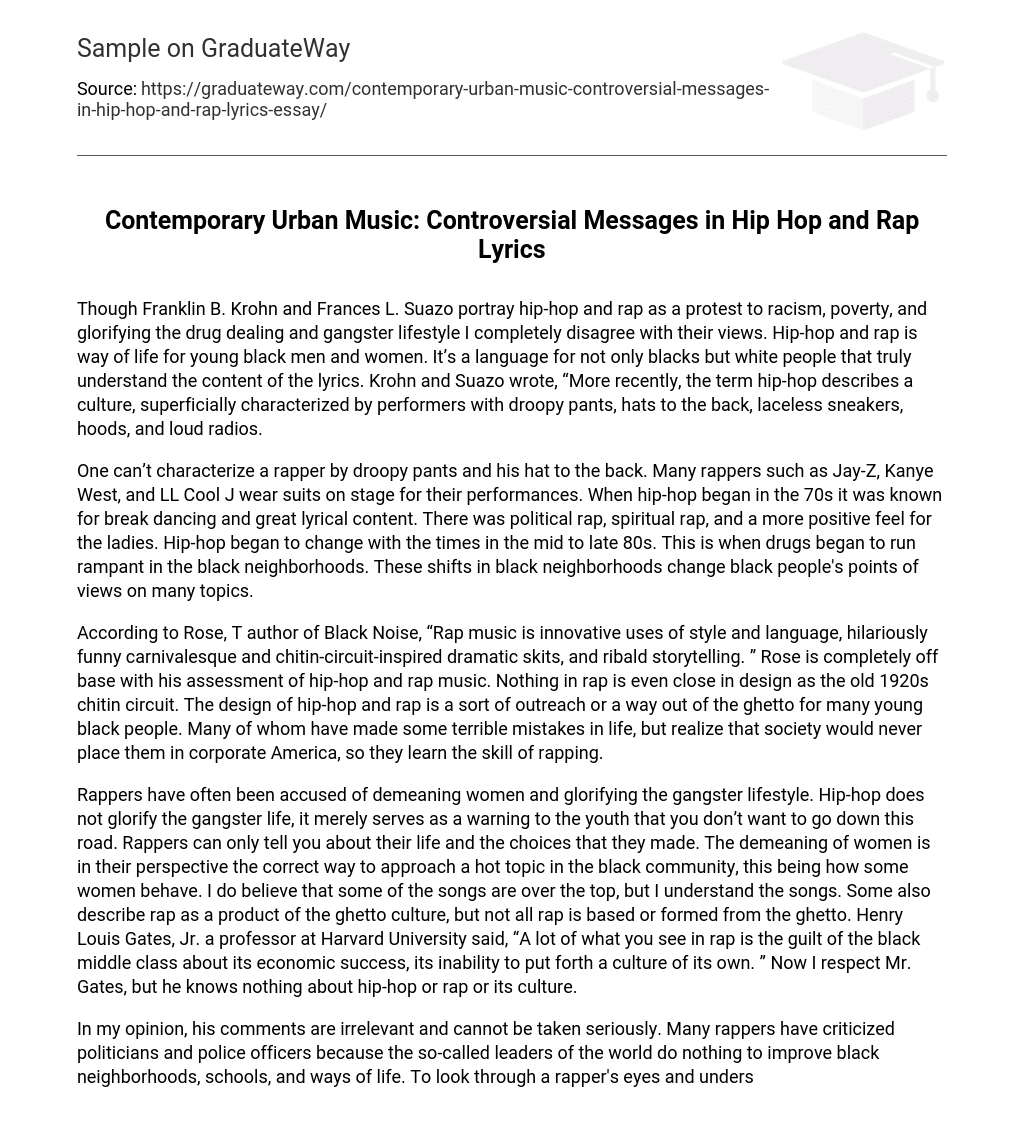In spite of Franklin B. Krohn and Frances L. Suazo’s portrayal of hip-hop and rap as a form of protest against racism, poverty, and the glorification of the drug dealing and gangster lifestyle, I strongly disagree with their perspective. Hip-hop and rap represent a way of life for young black individuals, as well as a language that transcends racial boundaries for those who truly comprehend the lyrical content. According to Krohn and Suazo, hip-hop is now seen as a culture that is superficially characterized by performers sporting droopy pants, backward hats, laceless sneakers, hoods, and loud radios.
Despite the stereotype of rappers wearing baggy pants and backwards hats, artists like Jay-Z, Kanye West, and LL Cool J often choose to wear suits when performing. In the 70s, hip-hop was characterized by break dancing and meaningful lyrics. It included political rap, spiritual rap, and had a more positive attitude towards women. However, as societal changes occurred in the late 80s, hip-hop began to evolve. This evolution coincided with drug problems becoming more widespread in black communities, which impacted the perspectives of black individuals on different topics.
Rose (T), in his book Black Noise, argues that rap music showcases unique styles and language usage, along with entertaining skits and explicit storytelling. However, this assessment of hip-hop and rap is completely inaccurate. None of the elements found in rap resemble the traditional 1920s chitin circuit. Instead, hip-hop and rap provide an avenue for numerous young black individuals to escape the confines of their disadvantaged neighborhoods. These individuals, who may have made unfavorable life choices, recognize that they would never be embraced by corporate America. As a result, they hone their rapping skills as a means to liberate themselves from societal limitations.
Rappers have often been accused of objectifying women and glorifying the gangster lifestyle in their music. However, it is important to recognize that hip-hop does not endorse the gangster life but rather serves as a cautionary tale for young individuals by warning them about the consequences of following that path. Rappers can only share their own experiences and choices they have made. They argue that depicting women in a degrading manner reflects certain behaviors within the black community. Although I agree that some songs may cross boundaries, I still understand their perspective. It is worth noting that rap does not solely originate from or represent ghetto culture, despite misconceptions suggesting otherwise. Harvard University professor Henry Louis Gates, Jr., suggests that rap expresses the guilt felt by the black middle class due to their economic success and struggle to establish their own identity. While I respect Mr. Gates’ viewpoint, he seems to lack comprehensive knowledge about hip-hop, rap, and its cultural significance.
In my perspective, his remarks are unimportant and should not be regarded seriously. Numerous rappers have expressed disapproval towards politicians and police officers due to their perceived lack of efforts in enhancing black neighborhoods, schools, and lifestyles. To truly comprehend their perspective, one would need to have experienced a similar upbringing.
Dr. Dre, a renowned rapper and producer, was born and raised in the ghetto where he witnessed corrupt police officers engaging in unethical behavior and experienced politicians neglecting black voices. Despite these challenges, Dr. Dre played a significant role in launching the careers of three influential rappers: Eminem, Snoop Doggy Dogg, and 50 Cent.
In his debut solo album titled “The Chronic,” Dr. Dre opted to feature an image of marijuana on its cover. Regrettably, this portrayal led to a misconception that he was endorsing illegal drug use. In reality, Dr. Dre aimed to capture the euphoric experience often associated with marijuana consumption through his music.
Rap is often seen as a perplexing and noisy element of modern American pop culture, but it goes beyond that. It acts as a valuable teaching tool for those who haven’t experienced life in the ghetto, providing insights on how to escape its harsh realities. Additionally, it offers guidance for individuals who have resorted to drug dealing as their only means of supporting their families. Although I don’t support drug dealing in any way, I can understand this mindset because of my own background in the ghetto and my ongoing relationships with friends still living there. It’s important to recognize that many critics of rap are older white individuals who lack understanding of the emotions and experiences faced by young black men.
Rabbi Eric H. Yoffie claims that gangster rap, a type of music that contains content deemed filthy and vile, serves as a vehicle for widespread dissemination of pornography to children. He suggests that this music far surpasses what even the most tolerant parent would consider an expected outcome of the generation gap. In making this statement, the Rabbi highlights the evident generation gap between older white individuals and younger black individuals. The older generation struggles to comprehend the presence of violence, drug dealing, and substance abuse within black communities.
They believe that black people, including those who are professionals like doctors and lawyers, are seen as uneducated. Even as successful rappers emerge, figures like Oprah Winfrey and Reverend Al Sharpton consistently criticize rap music and its artists without truly addressing the underlying issues. These issues stem from the lack of quality education, inadequate neighborhoods, and limited opportunities for black individuals. Hip-hop and rap serve as a means for the younger generation to share their stories with the public through entertainment.
Work Cited
Krohn, Franklin and Suazo (1995) wrote a paper on the controversial messages found in hip-hop and rap lyrics.





